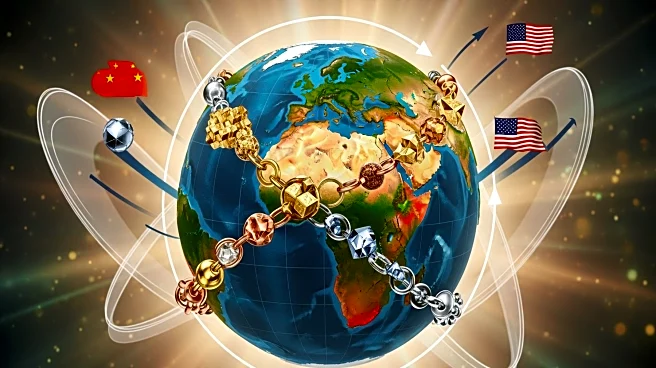What's Happening?
The United States has surpassed China as Africa's largest foreign investor, marking a significant shift in global economic dynamics. According to recent figures, the US invested $7.8 billion across Africa in 2023, compared to China's $4 billion. This
change is largely driven by the US International Development Finance Corporation (DFC), established during President Trump's first term, which aims to counter China's influence in strategic regions. A notable example is the $3.9 million grant awarded to Rwandan mining company Trinity Metals by the DFC to develop its mines producing tin, tantalum, and tungsten. This investment reflects the US's strategic interest in securing critical minerals and metals essential for technology and defense industries.
Why It's Important?
The shift in investment dynamics between the US and China in Africa has significant implications for global supply chains, particularly in the technology and defense sectors. By increasing its investment in African mineral resources, the US aims to reduce dependency on Chinese processing capabilities and secure a stable supply of critical materials. This move could enhance the US's geopolitical influence in Africa and strengthen its position in the global market for essential minerals. African countries, meanwhile, have the opportunity to leverage these investments to develop their economies, though they must navigate complex negotiations to ensure favorable terms.
What's Next?
As the US continues to expand its investment in Africa, it is likely to face challenges in maintaining equitable and sustainable partnerships with African nations. The focus will be on developing frameworks that ensure fair distribution of benefits and support local economies. Additionally, the US may need to address concerns about environmental and labor standards in mining operations. The evolving geopolitical landscape will require careful diplomacy to balance interests and foster long-term cooperation.
Beyond the Headlines
The increased US investment in Africa could lead to broader economic and social changes, including improved infrastructure and job creation. However, it also raises ethical questions about resource exploitation and the potential for neocolonial dynamics. African nations must assert their interests to avoid unfavorable agreements and ensure that investments contribute to sustainable development.















